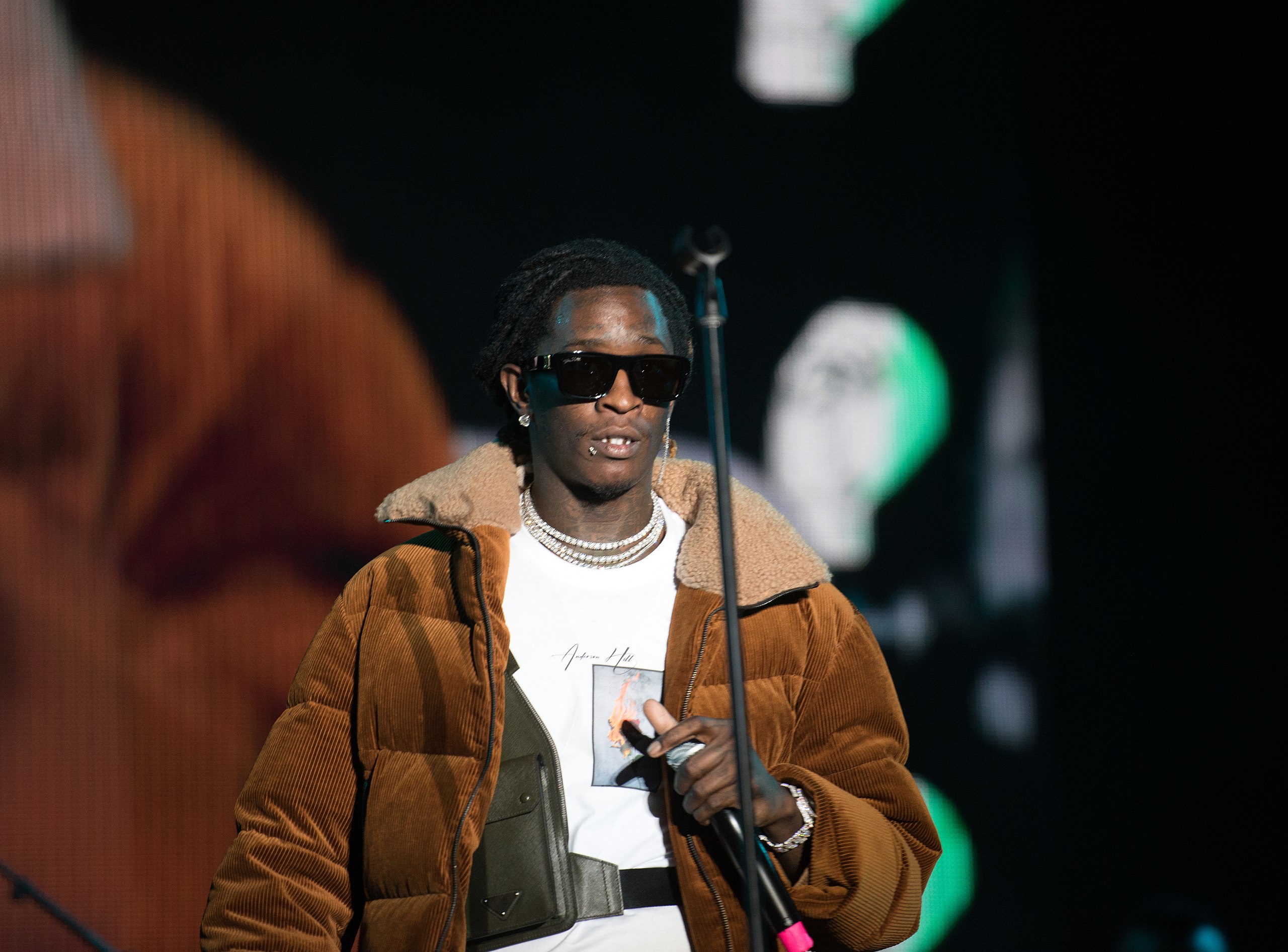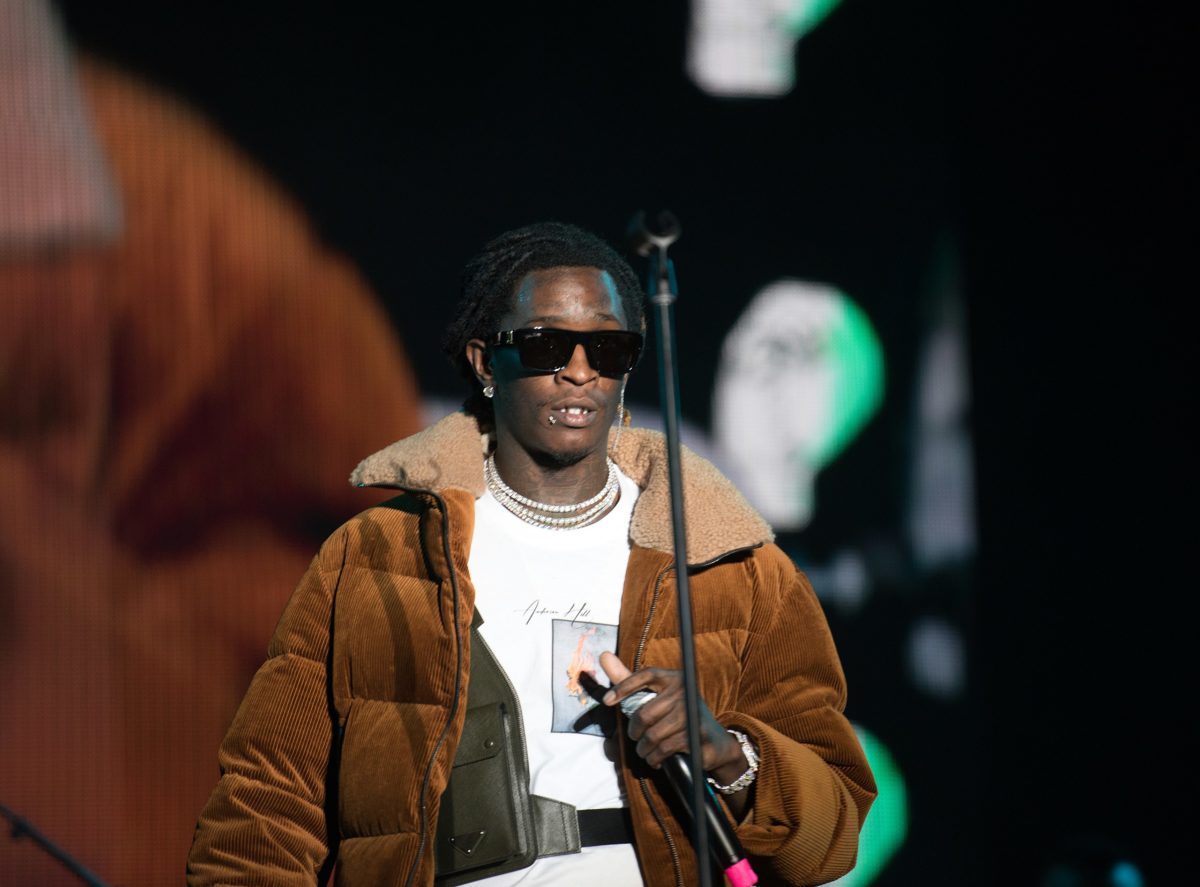Newsletter
Young Thug’s ‘Racketeering’ Charges are Absurd
The racketeering charges against Young Thug, Gunna, and YSL are over-broad, over-stated and unnecessarily harsh.


Young Thug’s ‘Racketeering’ Charges Are Absurd
by Jerry Iannelli
On May 9, an Atlanta-area grand jury charged rappers Young Thug and Gunna, two of the most popular music artists of this generation, with taking part in a massive, murderous, and allegedly organized criminal conspiracy. The Fulton County indictment alleges that 28 people associated with Young Thug’s record label—Young Stoner Life (YSL) Records—committed 56 different crimes, including armed robbery, carjacking, and murder. Gunna (A.K.A. Sergio Kitchens) is charged with receiving stolen property and multiple counts of drug possession. In the most high-profile charge, the Grammy-award-winning Young Thug (A.K.A Jeffrey Williams) is accused of hiring a rental car later used to kill a person.
State prosecutors allege the entire record label was, in fact, a “criminal street gang” that violated Georgia’s version of the Racketeer Influenced and Corrupt Organizations, or RICO, Act, an offshoot of the federal law passed in 1970 to take down America’s major mafia families.
If it sounds unbelievable that one of the most well-known record labels in contemporary hip-hop was in reality a mafia-style enterprise, that’s because it almost certainly is. While the federal RICO statute may be best known for taking down the Gambino crime family and the Hells Angels, the case against YSL is instead a perfect microcosm of how local and federal prosecutors often use RICO charges in contemporary America: Rather than reserve RICO statutes to take down rich criminal syndicates with actual structural power in U.S. society—like the Trump Organization or the architects of the 2008 financial crisis—prosecutors often use the law to push groups of (often low-income) Black and brown defendants to turn on one another or take plea deals to avoid decades in prison.
While Young Thug may now be a household name, Williams grew up in housing projects in Atlanta, cycled in and out of the juvenile legal system, and was unable to fix his missing teeth until finding success as a rapper. Additionally, the indictment lists incidents as far back as 2013, before Williams found mainstream success and before Kitchens’ career even began. Many of the 28 other people charged simply appear to be Williams’ friends from Atlanta, rather than the architects of a high-level criminal syndicate.
Fulton County District Attorney Fani Willis’s office alleges that YSL constitutes a “gang” because members often wear clothing with the label’s logo on them or get YSL tattoos. Prosecutors claim the group’s repeated use of “green heart,” “green snake,” and other emojis prove that YSL is a criminal enterprise. In multiple instances, prosecutors allege that lyrics to songs by Young Thug and Gunna are evidence of the group’s criminal intent.
Among many other examples, prosecutors claim that when Young Thug rapped “Hey, this that slime shit, hey, YSL shit, hey, killin 12 shit, hey, fuck a jail shit, hey” in the 2016 song “Slime Shit,” he was actually committing “an overt act in furtherance of the conspiracy.”
The indictment is arguably one of the most egregious RICO cases filed since 2016’s “Bronx 120” gang raid, in which scores of young Black men in the Bronx were swept up on “racketeering” charges despite the fact that many of those charged had no ties to gang activity at all.
Racketeering charges are serious—a single RICO conviction in Georgia leads to a mandatory five years and up to 20 years in prison. DA Willis has said that her office is seeking to place some people associated with YSL in prison for life. The nation’s original federal racketeering law was passed in 1970 to allow law enforcement agencies to take down, well, rackets—large criminal syndicates with economies unto themselves and the ability to corrupt local politics. Drug cartels with enough money and resources to corrupt local officials are a great example; so too are the old-school mafia families that had control of multiple black-market industries, like drug dealing, sex work, and gambling. (In the 1990s, Manhattan prosecutors alleged in a RICO case that the Lucchese crime family had monopolized New York City’s entire garbage-hauling industry, for example.) At the federal level, people involved with “criminal organizations” can be charged under the RICO statute if they commit or simply agree to commit just two crimes out of a list of 35, including murder, bribery, arson, money laundering, illegal gambling, fixing a sporting event, human trafficking, or selling drugs.
But laws are only as good as those who enforce them, and prosecutors have found creative ways to use RICO statutes to throw the book at whomever they please. In another high-profile incident, Willis, the same prosecutor going after YSL, in 2015 convicted 11 Black Atlanta school teachers of racketeering for cheating on standardized tests. Critics said the indictment was over-broad, stretched the bounds of what constituted RICO, and was discriminatory, given that educators of color were targeted even though cheating on standardized tests is common across the country.
wild how the government has an itemized list of every time and place a rapper has sneezed in the past year but no way to stop mass shooters who publicly workshop their manifestos online
— jaboukie (@jaboukie) May 14, 2022
While bulk-filing RICO charges against alleged gang members may seem like a messy prosecutorial tactic, the strategy often succeeds in forcing people to take plea deals. In the 2016 “Bronx 120” case, nearly all of the more than 120 alleged co-conspirators took plea deals. But a 2019 report by a CUNY School of Law professor found that more than half of the people charged in what prosecutors at the time called the “largest gang takedown” in U.S. history were not actually alleged to have been in a gang at all. Ultimately, two-thirds of the people charged were not convicted of any violent crime. And the vast majority of those charged pleaded to significantly less serious crimes than prosecutors had initially alleged.
Despite prosecutors’ best efforts, the 88-page indictment against YSL Records fails to illustrate how the label was an organized “racket.” As the New York Times’s Joe Coscarelli noted on Twitter, the indictment claims that actions ranging from speeding, posting on Instagram, and threatening a mall security guard all the way up to murder were part of one large “conspiracy.” While some of the charges alleged in the indictment are significant, the actions alleged hardly seem like the coordinated efforts of a mafia-style syndicate. When so many other true criminal enterprises exist in America, it’s hard to take an indictment like this seriously.
In the news
Contact us at newsletter@theappeal.org so we can feature your work here.
New York Republicans wasted no time calling for a statewide reinstatement of the death penalty in response to the racist massacre at a Buffalo supermarket over the weekend. The state hasn’t carried out an execution since 1963, but in comments this Sunday, two GOP gubernatorial candidates expressed support for bringing capital punishment back to New York. [Nick Reisman / Spectrum News]
Celestine Chaney, a grandmother of six, was among the ten people killed at the mass shooting in Buffalo, New York. In total, 13 people, ages 20 to 86, were shot. All but two were Black. “My grandmother just passed and others lost their lives over nonsense over nothing, basically because of the color of their skin,” her grandson told CNN. [Alisha Ebrahimji, Dakin Andone and Amir Vera / CNN]
President Joe Biden told local elected officials to spend unspent COVID relief money on law enforcement. “Use these funds we made available to you; prioritize public safety,” Biden said. “Do it quickly before the summer, when crime rates typically surge.” [Shannon Pettypiece / NBC News] From The Appeal: As Brian Dolinar reported, many jurisdictions have already spent COVID relief money on law enforcement.
Pandemic-related trauma — isolation, death of loved ones, stunted emotional development — along with limited recreational and academic programs, are likely leading some young people to commit crimes. [Sylvie McNamara / Washingtonian]
New York City Police Department officers broke a 61-year-old grandmother’s arm after they thought she was filming them. [Nick Pinto / Hell Gate]
The New Jersey Supreme Court ordered 85-year-old former Black Panther Sundiata Acoli to be released from prison, noting that his prison record for more than 25 years had been “exemplary.” In 1974, Acoli was convicted of killing a state trooper. [Ed Pilkington / The Guardian]
ICYMI—From The Appeal
Elizabeth Weill-Greenberg reported on the story of Joshua Lee Smith, who claims in a civil rights lawsuit that he was left paralyzed after a trip to the hospital, during which staff accused him of faking his symptoms and instead called the police, who ultimately hauled him off to jail. Smith awoke the next morning unable to move, and only then received treatment for what doctors discovered was a ruptured abscess on his spine.
Tina Vasquez reports that as police chief of Morrisville, North Carolina, Patrice Andrews promised not to work with ICE, but then personally ordered the arrests of anti-ICE demonstrators who’d gathered to protest the deportation of Samuel Oliver-Bruno, a leader in the state’s sanctuary movement. Last year, Andrews was appointed police chief of the Durham police department.
That’s all for this week. Feel free to leave us some feedback, and if you want to support our relaunch, please donate here.
